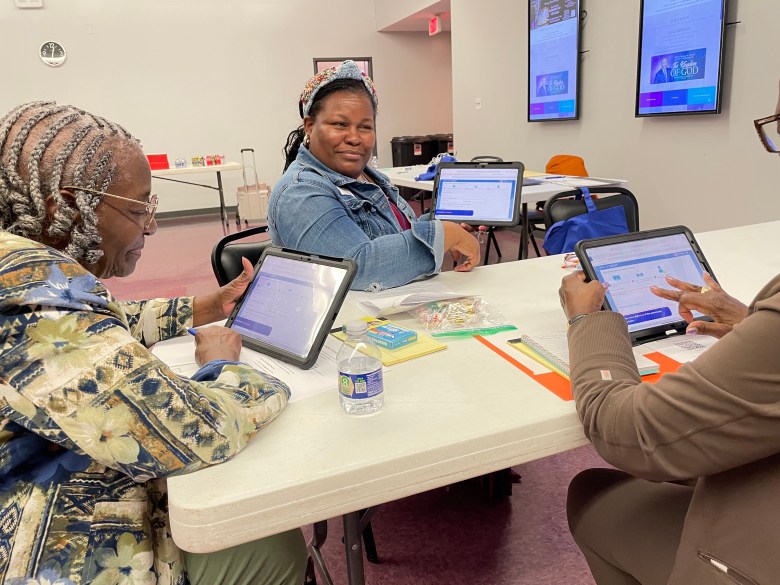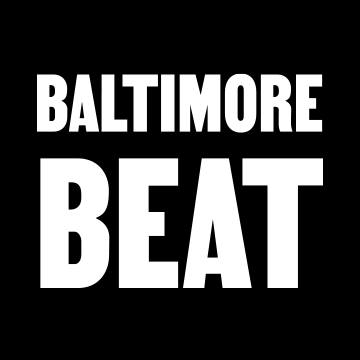
This story was first published in Technical.ly.
For two years, staff from Baltimore’s public library system have visited senior centers to help older adults understand the online landscape governing their healthcare.
Known as digital navigators, the workers taught digital skills classes at the centers while also helping seniors use online patient portals and search for providers.
The work may not be done, but the program still ended in August, when the Health Resources and Services Administration (HRSA) grant that funded it expired.
Darius Butler, who worked as a digital navigator for the program, visited the Sandtown-Winchester senior center in West Baltimore once a week. He said he was disappointed the work couldn’t continue after seeing the progress seniors made during the program.
“For most of our classes, the seniors were willing to go the extra mile and ask as many questions as possible from us, because they weren’t sure about whether or not they would be able to have these services again,” Butler said. “They wanted to get the most out of it.”
The program also partnered with the University of Maryland School of Nursing to send nurses and nursing students to senior centers and Enoch Pratt branches. There, they discussed health concerns, performed blood pressure checks and helped residents contact their doctors.
Tara Bhardvaj, who works as a data analyst at Enoch Pratt and served as the program manager, explained that pairing digital navigators with healthcare professionals helped address multiple challenges in accessing healthcare in the digital age. Those issues include navigating insurance, accessing health records online and managing the constraints of short doctor visits.
“It was really a two-pronged approach to one, have the digital skills and tools to understand your portal and scheduling,” Bhardvaj said, “but also to have that in-person element where people felt supported, and knew where to find resources and understand their health information.”
The program also offered drop-in hours at Enoch Pratt branches, where residents could schedule one-on-one appointments with digital navigators and meet with nurses when available. Three navigators were funded through the HRSA grant, while seven others, supported by American Rescue Plan Act (ARPA) funding, will continue their work teaching general technology skills.
Baltimore City Information Technology (BCIT) administered the HRSA grant. The city’s IT agency used other parts of the funding to expand fiber internet access to Baltimore City Health Department senior centers and equip them with devices and hotspots, according to a statement that BCIT Marketing and Communications Manager Rafael McFadden attributed to BCIT’s Office of Broadband and Digital Equity. The grant totaled a little over $2.3 million, per the HRSA website, but McFadden did not immediately confirm the exact amount that went to each project.
With the HRSA grant wrapped up and the ARPA funding set to end in June 2026, Butler is concerned about the lack of ongoing support for digital navigators.
“Especially with the current climate we’re in, people tend to take for granted that not everybody has the same skill set, so people like myself and my colleagues are needed,” Butler said. “The fact this is not acknowledged or even outright ignored by some people is disheartening.”
“Especially with the current climate we’re in, people tend to take for granted that not everybody has the same skill set.”
Darius Butler, digital navigator
Shane Williams, chief of end-user services and information systems at Enoch Pratt, is working to develop an artificial intelligence curriculum, as the Trump administration is now more eager to fund AI initiatives.
“Because there’s so much money now being poured into artificial intelligence, now is the time to create some type of AI curriculum, and that’s the money that we really should be going after to then build out new programs,” Williams said.

But similar work is continuing elsewhere. Helen Hughes, a pediatrician and medical director of telemedicine at Johns Hopkins School of Medicine, received a digital equity fund grant from BCIT to provide community-based training on MyChart, the online patient portal, for older adults.
Hughes said that since the pandemic, telemedicine visits at Johns Hopkins have surged — from about 70 per month across all of Johns Hopkins Medical facilities before the COVID-19 pandemic to 30,000 per month now. MyChart has also become increasingly important to booking these appointments and accessing follow-up care instructions.
“Healthcare became much more technology-driven in that first year of COVID and that has continued,” Hughes said.
The grant funds Johns Hopkins staff to visit three senior centers in East Baltimore once a month for a year to assist older adults. The sessions include general digital skills training — such as logging into email, identifying spam and setting up two-factor authentication — as well as instruction focused specifically on using MyChart. The latter session is interactive, letting participants work through a simulated scenario to learn how to access features such as scheduling appointments or reordering medication.
But Hughes remains worried about ongoing funding. Her team applied for the National Telecommunications and Information Administration’s Digital Equity Competitive Grant, which the Trump administration terminated in May along with the Digital Equity Act.
“It’s a hard time to be thinking about how to sustain this type of work,” Hughes said, “so we will just continue to be thinking about that in a creative way.”
The post This now-defunct Enoch Pratt program helped older Baltimoreans navigate online healthcare appeared first on Baltimore Beat.

